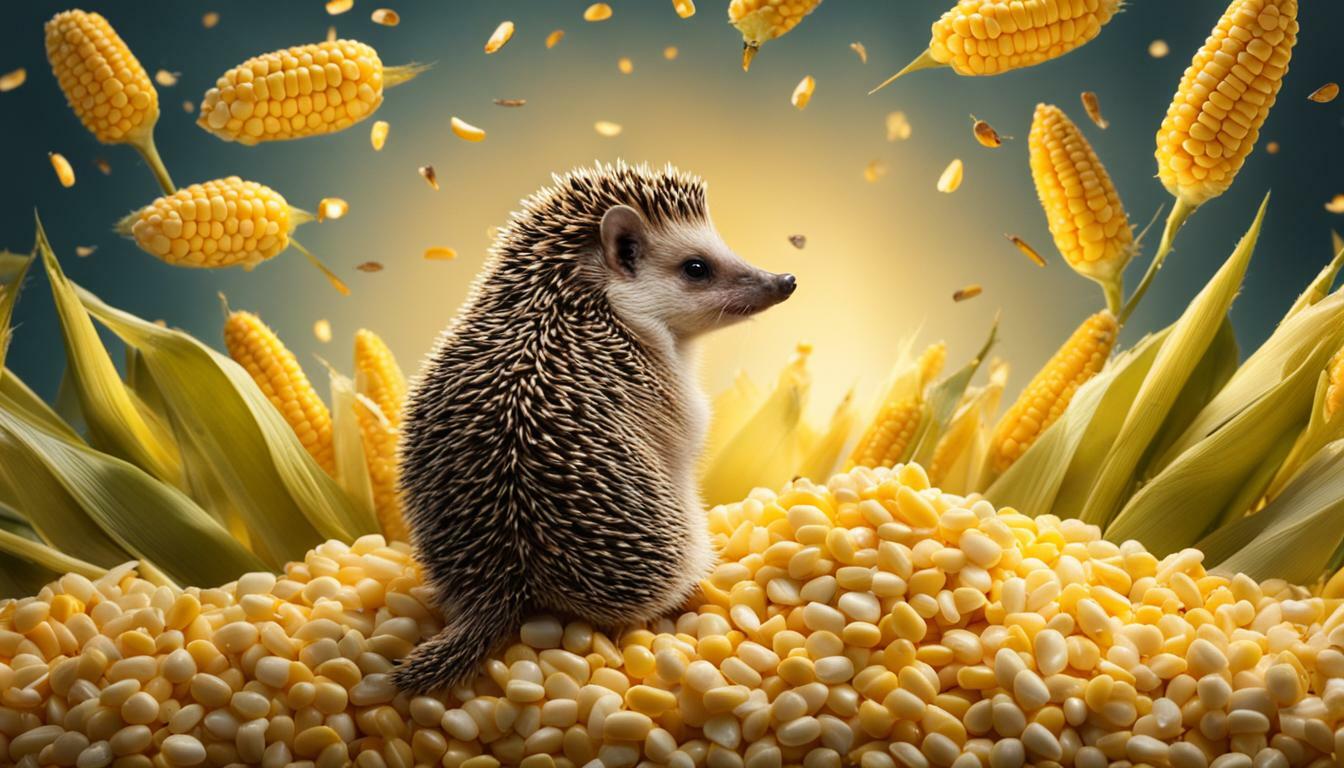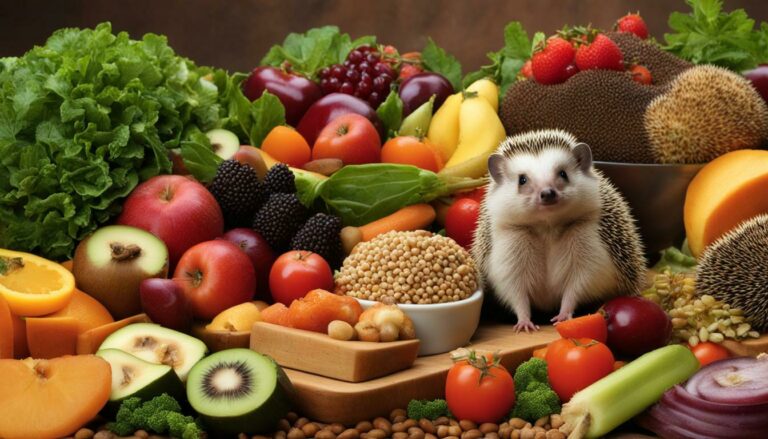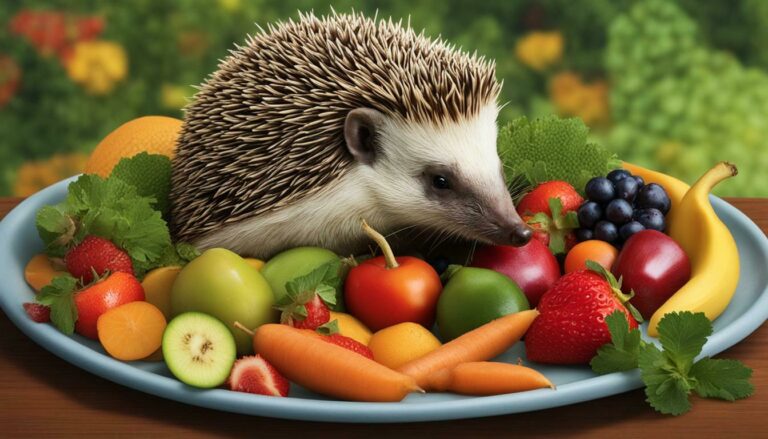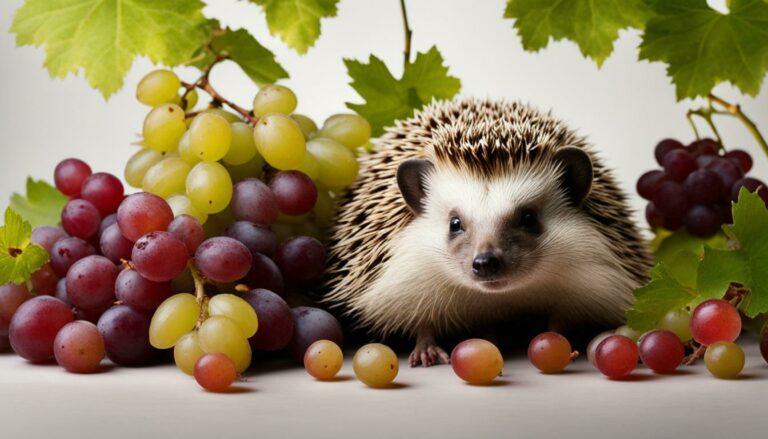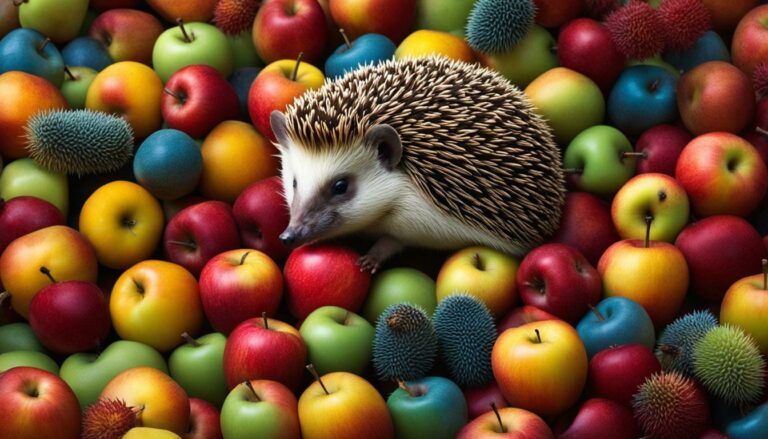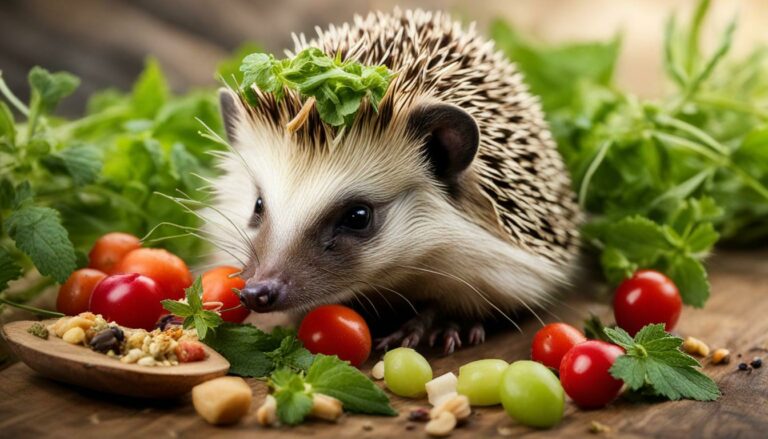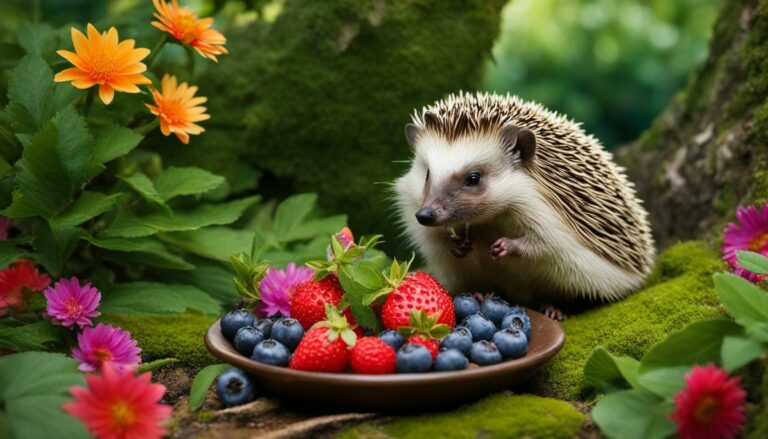An Expert Guide: Can Hedgehogs Eat Corn?
When it comes to the diet of hedgehogs, it’s important to provide them with a balanced and nutritious meal plan. Hedgehogs are known to be greedy eaters and are prone to obesity, so it’s essential for owners to regulate their feedings mindfully. In this expert guide, we will explore the question of whether hedgehogs can eat corn and discuss the potential benefits and risks associated with including corn in their diet.
Key Takeaways:
- Pet hedgehogs thrive on a diet high in proteins, low in fats, and rich in chitin.
- Hedgehogs in the wild mainly eat insects and small animals, along with some fruits and vegetables.
- While hedgehogs can eat corn, it should only be given in small quantities due to its carbohydrate content and the potential risk of choking.
- Hedgehogs can consume sweet corn and corn on the cob as treats, but cornflakes and canned corn should be avoided.
- When feeding corn to hedgehogs, it’s important to crush the kernels and ensure they are easily chewable.
Hedgehog Diet and Nutritional Needs
Hedgehogs have specific dietary needs that must be met in order for them to thrive as pets. Feeding them a balanced and nutritious diet is crucial for their overall health and well-being. As insectivores, hedgehogs require a diet high in proteins and low in fats, with an added focus on consuming foods rich in chitin, such as insects.
A hedgehog’s diet should primarily consist of high-quality dry cat food or specialized hedgehog food that has a protein to fat ratio of approximately 34% to 15%. Poultry-based cat biscuits are a popular choice among hedgehog owners. It is important to ensure that the protein content in the food falls between 28% and 35%, while the fat content remains within the range of 12% to 15%. This balance is necessary to prevent obesity, which hedgehogs are prone to due to their sedentary lifestyle as pets.
In addition to dry cat food, hedgehogs can also be fed other suitable foods. Lean meats, such as boiled or scrambled eggs, can be included in their diet for added protein. Small amounts of fruits and vegetables, like berries, kiwi, and leafy greens, can be offered as treats. It is important to monitor the sugar content in fruits and feed them sparingly to prevent weight gain and potential health issues like diabetes. Insects, such as mealworms and crickets, are an essential part of a hedgehog’s diet and provide both protein and mental stimulation. However, care should be taken to avoid overfeeding insects, as they are high in calories and can contribute to weight gain.
It is important for hedgehog owners to monitor their pet’s weight and adjust their food intake accordingly. Hedgehogs should be fed one to two tablespoons of dry cat food per day, along with a teaspoon of fruits and vegetables and a limited amount of insects. It is recommended to use a baby scale to monitor weight gain, as a 10% increase in weight may indicate overfeeding. Any uneaten food should be disposed of the next day to prevent spoilage, and fresh water should always be available.
| Recommended Foods for Hedgehogs | Foods to Avoid |
|---|---|
| – High-quality dry cat food – Specialized hedgehog food – Lean meats (chicken, turkey, beef) – Boiled or scrambled eggs – Small amounts of fruits and vegetables – Insects (mealworms, crickets) |
– Milk – Avocado – Bread – Raw meat – Citrus fruit – Raisins – Onion – Grapes – Nuts & seeds – Chocolate – Junk food – Raw egg yolk – Spicy food |
Feeding hedgehogs a well-balanced diet that meets their nutritional needs is essential for their overall health and happiness. By providing them with the right combination of protein, fats, and nutrients, owners can ensure that their hedgehogs thrive and live long, fulfilling lives.
What Do Hedgehogs Eat in the Wild?
In their natural habitat, hedgehogs primarily feed on insects, small animals, and a variety of fruits and vegetables. Their diet is diverse and depends on the availability of food sources in their environment. Hedgehogs are opportunistic feeders and will consume whatever they can find to meet their nutritional needs.
Insects: Hedgehogs are insectivores and rely heavily on insects as a main part of their diet. They will eat a wide range of insects, including worms, caterpillars, millipedes, slugs, snails, mealworms, and ground beetles. These insects provide essential protein and chitin, which is a type of fiber that helps with digestion.
Small animals: Hedgehogs are also known to eat small animals like baby mice, frogs, and even birds’ eggs. These animal sources provide additional protein and other nutrients that contribute to their overall health.
Fruits and vegetables: While hedgehogs primarily rely on insects and small animals for their diet, they will also consume certain fruits and vegetables when available. Some examples include berries, kiwi, papaya, watermelon, peaches, cherries, apples, courgette, green pepper, cucumber, broccoli, leafy greens, peas, and corn. However, fruits and vegetables should be given in small amounts as hedgehogs have a limited ability to digest plant matter.
| Insects | Small Animals | Fruits and Vegetables |
|---|---|---|
| Worms | Baby mice | Berries |
| Caterpillars | Frogs | Kiwi |
| Millipedes | Birds’ eggs | Papaya |
| Slugs | Watermelon | |
| Snails | Peaches | |
| Mealworms | Cherries | |
| Ground beetles | Apples |
It’s important to note that while hedgehogs in the wild have access to a wide range of food sources, pet hedgehogs have specific nutritional requirements that need to be met through a balanced and appropriate diet provided by their owners. The diet of a wild hedgehog may not be suitable for a pet hedgehog, and it’s essential to consult a veterinarian or expert to ensure the right nutrition for your pet.
Can Hedgehogs Eat Corn?
Corn can be included in a hedgehog’s diet, but it is important to understand the considerations and precautions associated with feeding them this particular food. Hedgehogs are omnivores and in the wild, they consume a variety of foods, including insects, small animals, and some fruits and vegetables. While corn is not a natural part of their diet in the wild, it can be offered as a treat or occasional addition to their regular diet.
When it comes to feeding corn to hedgehogs, it is crucial to select the right type of corn. Not all corn-based foods are suitable for hedgehogs, as they may contain additives, preservatives, or high levels of carbohydrates that can be harmful to their health. It is best to stick to fresh, organic corn and avoid processed corn products such as cornflakes or canned corn.
In terms of nutritional benefits, corn can provide fiber, iron, copper, and vitamins A and C to hedgehogs. It has a low-fat content, which is important for preventing obesity in these animals. However, it is essential to feed corn in moderation due to its relatively high carbohydrate content. Too much carbohydrate in a hedgehog’s diet can lead to weight gain, diabetes, and other related health issues.
When introducing corn to a hedgehog’s diet, it is recommended to crush the kernels to make them easier to chew and swallow. Cooked corn can also be offered, but make sure to crush the kernels regardless of whether they are raw or cooked. Corn should always be served as a part of a balanced diet, along with other appropriate foods such as high-quality cat or hedgehog kibble, lean meats, insects, and small amounts of fruits and vegetables.
Table: Types of Corn Suitable for Hedgehogs
| Type of Corn | Suitability for Hedgehogs |
|---|---|
| Sweet Corn | Can be fed as a treat |
| Corn on the Cob | Can be fed as a treat |
| Corn Flakes | Not recommended due to additives and difficulty in digestion |
| Canned Corn | Best avoided due to processing and additives |
Summary:
- Corn can be included in a hedgehog’s diet, but it should be offered in moderation and as part of a balanced diet.
- Choose fresh, organic corn and avoid processed corn products.
- Crush the corn kernels before serving to make it easier for hedgehogs to eat.
- Cooked corn can also be offered, but remember to crush the kernels.
- Feed corn as a treat or occasional addition to a varied diet that includes high-quality kibble, lean meats, insects, and small amounts of fruits and vegetables.
Types of Corn Suitable for Hedgehogs
When it comes to feeding corn to hedgehogs, it is important to choose the right types of corn that are safe and beneficial for their dietary needs. While corn can be a tasty treat for hedgehogs, not all varieties are suitable for their consumption. Here are some types of corn that hedgehogs can safely eat:
- Sweet Corn: Sweet corn, also known as sugar corn or pole corn, is a popular choice among hedgehog owners. It is a variety of corn that contains acids and sugar, making it a delicious treat for hedgehogs.
- Corn on the Cob: Hedgehogs can also enjoy corn on the cob as a special treat. This refers to cooked ears of sweet corn that are served with the kernels still attached to the cob. It provides a fun and engaging way for hedgehogs to consume corn.
- Fresh Organic Corn: Opting for fresh organic corn is always a good choice for hedgehogs. By selecting organic corn, you can ensure that it is free from harmful pesticides and chemicals.
It’s important to note that while these types of corn are safe for hedgehogs to eat, they should still be given in moderation. Corn should not make up the majority of a hedgehog’s diet, as it is high in carbohydrates and can contribute to weight gain if consumed excessively.
Understanding Hedgehog Dietary Needs
Hedgehogs have specific dietary requirements that need to be met for their overall health and well-being. While corn can be a tasty addition to their diet, it should be considered as a treat rather than a staple food. Hedgehogs require a balanced diet that includes a variety of protein sources, low-fat content, and adequate fiber.
Their primary diet should consist of high-quality dry cat food or specialized hedgehog food that has a protein to fat ratio of around 34% to 15%. This ensures that they receive the necessary nutrients without consuming excessive amounts of fat. Lean meats, boiled or scrambled eggs, some fruits and vegetables, and insects can also be incorporated into their diet in moderation.
It’s important for hedgehog owners to carefully monitor their pet’s weight and adjust their food intake accordingly. Hedgehogs are prone to obesity, so it’s crucial to provide them with the right amount and type of food to maintain a healthy weight. Additionally, always ensure that fresh water is available for your hedgehog to stay hydrated.
Summary
Feeding corn to hedgehogs can be a fun and rewarding treat for these curious creatures. By choosing the right types of corn, such as sweet corn or corn on the cob, and incorporating them into a balanced diet, hedgehogs can enjoy the nutritional benefits without any adverse effects. Remember to feed corn to hedgehogs in moderation and prioritize their overall dietary needs to ensure their well-being.
| Type of Corn | Suitability for Hedgehogs |
|---|---|
| Sweet Corn | Safe and enjoyable treat |
| Corn on the Cob | Fun and engaging treat |
| Fresh Organic Corn | Safe and free from harmful chemicals |
How to Incorporate Corn Into a Hedgehog’s Diet
Corn can be offered to hedgehogs as a treat or occasional addition to their regular diet, but it should not make up the majority of their meals. Hedgehogs have specific nutritional needs, and their diet should consist primarily of high-quality poultry-based cat food or specialized hedgehog food that provides the right balance of proteins and fats. However, if you want to add some variety to your hedgehog’s diet, you can introduce corn in small amounts and take certain precautions.
When feeding corn to your hedgehog, it’s important to choose the right type. Fresh, organic corn is the best option, as it ensures your hedgehog receives maximum nutrients without the additional preservatives and chemicals found in non-organic foods. Check the top of the husk for any brown holes, as they may indicate worm infestation. Feel the kernels through the husk to ensure they are intact and plump. The husk should be green and tightly wrapped, indicating freshness.
Once you have selected a suitable ear of corn, wash it thoroughly before serving it to your hedgehog. You can either crush the corn kernels with a spoon to make them easier for your hedgehog to chew and swallow, or you can choose to cook the corn to soften it. If you decide to cook the corn, place the ear of corn in a pot of boiling water for a few minutes, then let it cool before serving. Avoid adding any salt or spices to the corn.
Remember that corn should only be a small part of your hedgehog’s diet and should not replace their staple cat food or hedgehog food. It should be offered as a treat or occasional addition to provide some variety. Monitor your hedgehog’s weight carefully, as they are prone to obesity. If you notice any weight gain, adjust the amount of food you are offering accordingly.
| Benefits of Corn for Hedgehogs | Risks of Corn for Hedgehogs |
|---|---|
|
|
Summary
While hedgehogs can eat corn, it should only be given as a treat or occasional addition to their regular diet. Choose fresh, organic corn and wash it before serving. Crush the kernels or cook the corn to make it easier for your hedgehog to eat. Remember to monitor your hedgehog’s weight and adjust their food portions accordingly to prevent obesity. Corn should not replace their staple cat food or hedgehog food, which provides the necessary balance of proteins and fats for their overall health and well-being.
Other Essential Foods for Hedgehogs
In addition to corn, hedgehogs require a balanced diet that includes a variety of protein sources, fruits, vegetables, and specially formulated hedgehog food. It is important to provide a diverse range of foods to ensure that hedgehogs receive all the necessary nutrients for their overall health and well-being.
Protein Sources: Hedgehogs are insectivores by nature, so it is essential to include a variety of protein sources in their diet. This can include high-quality dry cat food, high-quality dog food, specialized hedgehog food, lean meats (such as chicken or turkey), boiled or scrambled eggs, and even baby food.
Fruits and Vegetables: Fresh fruits and vegetables can be offered to hedgehogs as treats. Some suitable options include berries, kiwi, papaya, watermelon, peaches, cherries, bananas, apples, courgette, green pepper, cucumber, broccoli, leafy greens, peas, and carrots. It is important to note that fruits and vegetables should be given in moderation due to their sugar content.
Insects: Insects are an important part of a hedgehog’s diet, providing them with essential nutrients like chitin. Mealworms, crickets, waxworms, beetles, and grasshoppers are among the insects that hedgehogs can safely consume. It is recommended to provide live or freeze-dried insects, as store-bought insects might carry bacteria or parasites.
Sample Dietary Schedule for a Hedgehog:
| Meal | Food | Portion Size |
|---|---|---|
| Breakfast | High-quality dry cat food or specialized hedgehog food | 1-2 tablespoons |
| Lunch | Fruit or vegetable | 1 teaspoon |
| Dinner | Protein source (e.g., lean meats, boiled eggs) | Small amount |
| Snack | Insects | As a treat |
It is important to monitor your hedgehog’s weight and adjust their food portions accordingly, as they are prone to obesity. Additionally, always provide fresh water for your hedgehog to stay hydrated.
Remember, a well-balanced diet is crucial for the overall health and longevity of your pet hedgehog. Consulting with a veterinarian who specializes in exotic pets can provide further guidance on meeting your hedgehog’s nutritional needs.
Conclusion
By understanding the dietary needs of hedgehogs and making informed food choices, you can ensure that your pet hedgehog remains healthy and happy. Hedgehogs are omnivores, but their natural diet consists mainly of insects and small animals. Therefore, it is important to provide a balanced diet that includes a variety of high-quality foods.
When it comes to feeding hedgehogs, their staple diet should primarily consist of high-quality poultry-based cat food or specialized hedgehog food. These options provide the necessary proteins and fats that hedgehogs need to thrive. It is important to monitor your hedgehog’s weight and regulate their food intake to prevent obesity, as pet hedgehogs are prone to overeating.
In addition to their staple diet, hedgehogs can also enjoy a variety of fruits, vegetables, cooked meats, and insects as treats. However, these should be given in moderation and not make up the majority of their diet. Some fruits and vegetables, such as bananas and apples, should be given sparingly due to their high sugar content.
When it comes to feeding corn to hedgehogs, it is important to choose the right type. Hedgehogs can safely eat sweet corn and corn on the cob as treats, but other corn-based foods like cornflakes and canned corn should be avoided due to their nutritional composition and processing. Corn should be crushed or cooked and served in small quantities to prevent choking or indigestion.
In conclusion, providing a well-rounded and balanced diet is essential for the health and well-being of hedgehogs. By considering their nutritional needs and offering a variety of suitable foods, you can ensure that your pet hedgehog receives the necessary nutrients and stays happy and healthy for years to come.
FAQ
Q: What should hedgehogs eat in the wild?
A: Hedgehogs in the wild primarily eat insects, small animals, and some fruits and vegetables.
Q: What can pet pygmy hedgehogs eat?
A: Pet pygmy hedgehogs can eat high-quality dry cat food, high-quality dog food, specialized hedgehog food, lean meats, boiled or scrambled eggs, some fruits and vegetables, insects, and baby food.
Q: What kind of cat food can pygmy hedgehogs eat?
A: Preferred brands among pygmy hedgehog owners are Purina One and Iams. Poultry-based dry cat food high in protein and low in fat should make up the majority of a hedgehog’s diet.
Q: What insects can pygmy hedgehogs eat?
A: Pygmy hedgehogs can eat mealworms, crickets, beetles, waxworms, millipedes, grasshoppers, hornworms, and maggots. Live or freeze-dried insects are recommended.
Q: What fruits can pygmy hedgehogs eat?
A: Pygmy hedgehogs can eat berries, kiwi, papaya, watermelon, peaches, cherries, bananas, and apples. Grapes and raisins should be avoided as they are toxic to hedgehogs.
Q: What vegetables can pygmy hedgehogs eat?
A: Pygmy hedgehogs can eat courgette, green pepper, cucumber, broccoli, leafy greens, peas, corn, and carrots. Starchy vegetables like potatoes and celery should be avoided.
Q: What kind of meat can hedgehogs eat?
A: Hedgehogs can eat lean cooked meats such as chicken, turkey, beef, pheasant, lamb, liver, and kidney. Raw meat should never be given to hedgehogs.
Q: What is the staple diet for hedgehogs?
A: The staple diet for hedgehogs should be high-quality dry cat food or specialized hedgehog food with a protein to fat ratio of around 34% to 15%. This should make up the majority of a hedgehog’s daily diet.
Q: How often should hedgehogs eat corn?
A: Corn can be fed to hedgehogs in small quantities as a treat. It should not make up a significant portion of their diet due to its carbohydrate content and potential choking hazard.
